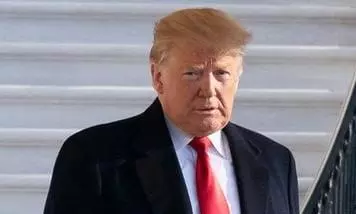
CHENNAI: Instead of negotiating with individual countries, the US will start sending letters informing trading partners of their blanket tariff rates from Friday, said President Donald Trump. Announcing a 90-day pause for reciprocal tariffs, Trump was confident of signing 90 trade deals. The US has signed preliminary deals with the UK, and Vietnam and agreed upon a framework deal with China. Negotiations with several trade partners, including India, are still on.
About 10-12 countries will get letters on Friday and the tariffs will range between 60-70 per cent and 10-20 per cent, said Trump. Countries will have to start paying tariffs from August 1, he added.
Though Trump had given a 90-day pause for negotiating trade deals, Trump does not have the power to enter a full-fledged trade agreement without receiving the fast-track authority from the US Congress. Hence all the trade deals signed or being negotiated are preliminary trade agreements and are subject to changes.
UK
Under the first part of a trade deal with the UK, most of the products imported to the US have a 10 per cent basic tariff. The 25 per cent tariff on UK cars and automotive parts, on top of an existing 2.5 per cent levy, was cut to 10 per cent for a maximum of 100,000 UK cars. Cars exported above the quota were subjected to a 27.5 per cent tariff. Zero per cent duty on steel and aluminium tariffs was a major part of the original deal, but the details are yet to be worked out.
In return, the UK has raised the quota of 1000 metric tonnes of US beef exports at 20 per cent tariff to 13,000 metric tonnes and granted a tariff-free quota of 1.4 billion litres of US ethanol.
Vietnam
As part of the trade deal with Vietnam, the US will impose a 20 per cent tariff on Vietnamese exports, and a 40 per cent duty on goods trans-shipped by Vietnam. In return, Vietnam will allow US goods to enter tariff-free.
China
The US and China agreed upon just a framework agreement on trade on June 26, 2025. According to the US, this includes China easing restrictions on rare earth exports and the US lifting certain export controls. However, details of this agreement have not been announced.
European Union
The EU finds that a striking a comprehensive deal in 90 days is impossible and hopes to sign an “agreement in principle”. It finds that if car, steel and aluminium tariffs remain at the same level, it will be hard for the EU side to accept the deal.
Japan
Japan has been seeking lower auto tariffs – a demand which the US has been resisting. Despite the recent spurt in imports, Japan wants to protect its rice market with trade barriers. The US is also pressuring Japan to increase imports of farm products, cars and oil. Though the talks have hit a roadblock, Japan is confident of a deal.
South Korea
Following disagreements on automobile and steel tariffs, South Korea wants extension of the July 9 deadline. It wants exemption from both sectoral tariffs and 25 per cent reciprocal tariffs.
South-east Asia
Being trade-driven economies, most of the South-east Asian countries have offered either zero or lower tariffs on US imports to safeguard their jobs.
Indonesia has eased licensing requirements on import rules and offered to increase US access to critical minerals for the progress of trade talks. Taiwan has completed the second round of trade talks and has moved ahead on tariffs and non-tariff barriers. Malaysia is hopeful of clinching a deal before the July 9 deadline. Cambodia with a 49 per cent reciprocal tariff too is willing to meet the demands of the US.
South Asia
In South Asia, Bangladesh, which is heavily dependent on textile exports to the US, is expecting tariff reductions as the talks are still on. Pakistan too is expecting to sign a trade deal with the US soon.
Canada
The US had termed Canada’s digital services tax from June 30, 2025 an “attack” on American companies like Google and Amazon and had suspended talks. After Canada agreed to remove the tax, talks are likely to resume.
Mexico
Mexico’s talks with the US are still going on to get a quota system in place with reduced steel import tariffs.

